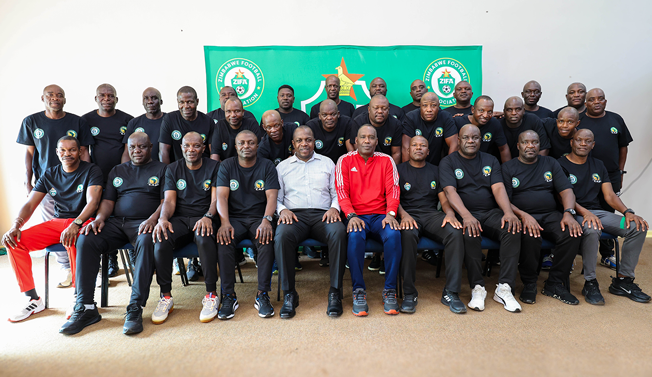
By Nqobile Magwizi, ZIFA President
The phone call came out of nowhere. One moment, I was running my communications company, focused on the usual press deadlines and client briefs. The next, I was in a meeting with the cricket authorities, talking about a merger that didn’t seem to make sense on paper – until it did. By the end of 2007, that unlikely union had given birth to Sportlight, a sports magazine with an unashamed bias: sixty percent football, with cricket and
everything else squeezed into the rest.
Under the editorial leadership of Hope Chizuzu, an ardent football journalist whose passion could fill a stadium, Sportlight became more than a magazine – it became a case study in running sport as a business. We were not just telling stories; we were selling advertising, negotiating with sponsors, and building partnerships that linked sport to commerce. The experience opened my eyes to the immense potential of sport – not only as entertainment, but as a serious contributor to economic activity and national development.
This week, I draw on early lessons that have stayed with me: football’s sustainability
depends not just on the passion of its fans, but on the strength of its commercial model –
from sponsorships and broadcasting rights to revenue sharing and branding that attracts
investment and keeps the game alive.
The Revenue Engine of Football
Football thrives when its commercial foundations are both strong and diverse. The most
successful leagues and clubs have long understood that matchday ticket sales alone
cannot sustain the sport. Instead, they have built a network of revenue streams anchored
on four essential pillars.
The first is corporate investment. Sponsorships and partnerships are the lifeblood of the
modern game, providing not only crucial funding but also credibility, wider marketing
reach, and connections to new audiences.
The second is broadcasting. Television and digital streaming deals can transform a
league’s financial position, generating the resources needed to invest in infrastructure,
nurture youth talent, and support player welfare.
The third pillar is merchandising. Jerseys, scarves, and other branded items are far more
than souvenirs – they are reliable income generators and constant ambassadors for the
club or league’s brand.
Finally, matchday and event revenue plays a vital role. Well-managed ticketing, hospitality,
and special events add both financial value and richness to the fan experience. Together,
these four pillars create the stable financial engine that enables football to grow, compete,
and inspire – on the pitch and far beyond it.
ZIFA’s Role in Building the Football Ecosystem
For Zimbabwean football to truly thrive, ZIFA must take the lead in shaping an environment
where business and sport grow together. Our goal is to make football not just a passion,
but also a professional and commercially attractive industry.
First, we’re working to standardise commercial structures. Clear rules and frameworks –
from club licensing requirements to sponsorship guidelines – give investors the confidence
that football is a safe and well-regulated space for their money.
Next, we’re focused on packaging our product. Our commercial team is fine-tuning
proposals for our leagues, national teams, and tournaments, positioning them as strong,
marketable products that appeal to broadcasters, sponsors, and fans. We want our
football to be more than just games – it should be an experience people want to be part of.
We’re also putting a premium on engaging stakeholders. Building strong relationships with
government, the corporate sector, and the media is central to expanding football’s
commercial footprint. This column is one way we share our journey – and listen to
feedback from those invested in the game’s growth.
Finally, we are committed to transparency and accountability. Business confidence comes
from knowing funds are managed responsibly. By publishing our financial statements, we
are making it clear that money entrusted to us will be handled exactly as agreed – openly
and with integrity.
At ZIFA, we see ourselves as custodians of the game’s future. By putting these building
blocks in place, we are laying the foundation for a football ecosystem where talent,
passion, and business work together for the good of the sport and the nation.
Lessons from Elsewhere
Countries with comparable economies have shown that football can be both a cultural
passion and a profitable enterprise. South Africa’s PSL, for example, leveraged broadcasting
rights and sponsorships to become self-sustaining. In East Africa, clubs like Young Africans
and Simba SC have built strong brand identities that attract regional sponsors and cross-
border fanbases. These successes did not happen overnight – they were the result of
deliberate, consistent strategies backed by professional management.
We are not expecting a quick fix. Locally, we are beginning to see more and more clubs
creating value around their brand assets and around their names. This is commendable.
Our Path Forward
Zimbabwean football has the passion, the talent, and the potential – now it’s time to turn that into action. ZIFA is ready to push beyond talk and lead the charge with ideas that clubs and partners can put into play right now.
Think about matchday. In many football-loving nations, it’s not just about the final whistle – it’s about the whole day. Fans arrive early, enjoy food and drinks, shop for team gear, and soak in the entertainment. It’s an experience that keeps them coming back week after week. Here at home, we can do the same. We’ve started conversations with local authorities to make our stadiums more welcoming – places where families feel safe and excited to spend the day, with football as the main attraction. Right now, some venues are only for the brave. That needs to change. When families join in, clubs grow their fan base and build stronger communities around the game.
Then there’s merchandising – a game-changer for football economies everywhere. Around the world, club shops sell millions of shirts, scarves, and branded products. Yet here in Zimbabwe, it’s often easier to find a Barcelona jersey than a Dynamos one. Some clubs, like Bulawayo Chiefs and Highlanders, are showing what’s possible, but some of our biggest teams still don’t have clubhouses or official stores. That’s money – and fan connection – slipping through our fingers. ZIFA will lead from the front to change this, ensuring revenue from merchandise stays in our football family.
Behind the scenes, technical partners quietly power successful clubs. Hydration suppliers, office equipment, transport, fuel, meals, and accommodation – all of these partnerships cut costs, raise professionalism, and free up funds for what matters most: developing and caring for our players.
And to make sure everyone has the tools to grow, ZIFA will roll out a Partnership Management Strategy designed for all levels of the game. We’ll provide templates, training, and mentorship so that every club and provincial association can tap into the same knowledge base
The goal is clear: take the raw passion of Zimbabwean football and turn it into a thriving, self-sustaining industry – one match, one fan, and one partnership at a time.
Conclusion
Football is more than a game; it is a national asset with the power to unite communities, inspire dreams, and contribute to the economy. If we get the business side right, we will not only raise the quality of play on the pitch, but also create livelihoods, attract tourism, and build a legacy that future generations will inherit with pride.
I believe that Zimbabwe has the talent, the passion, and the resilience to make this vision a reality. The beautiful game deserves a beautiful future – and together, we can build it.
More News

Sharpening the Touchline before Kick-off
Mon 9 Feb 2026
As Zimbabwe’s topflight clubs put the finishing touches to their preparations ahead of the new season, a quieter but equally significant process is unfolding at ZIFA Village. This week, the CAF A Coaches Refresher Course is underway, bringing together some of the country’s most experienced coaches at a moment when clarity of ideas, sharp thinking […]

